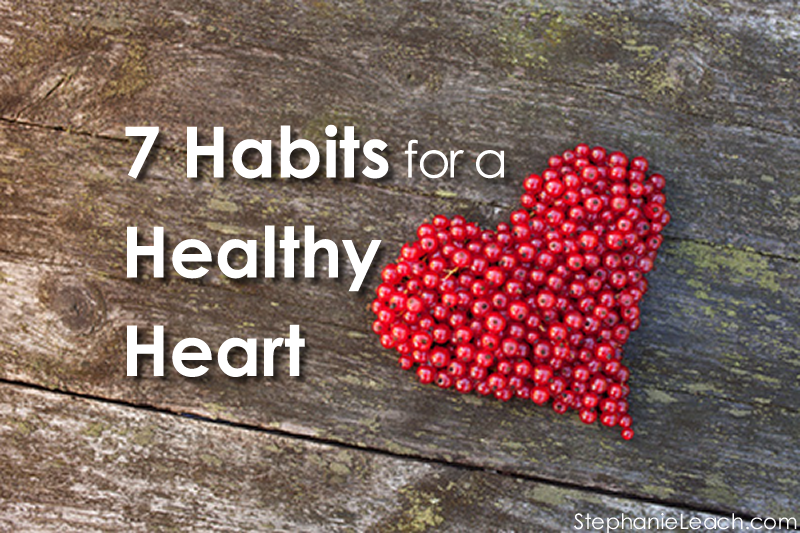One Woman. Every Minute.
That’s how many women have their lives cut short by heart disease. While 1 in 31 will die of breast cancer, 1 in 3 will die of heart disease. That’s about one woman every minute – a staggering number.
But it doesn’t have to happen to you, even if you have a family history of heart disease.
Here are 7 habits for a healthy heart – ones that will serve you well for a lifetime.
1. Manage Stress
Constant stress triggers risk factors for heart disease.
Take time to relax. Ignore the laundry pile and dishes in the sink for 15-20 minutes. Just sit quietly with a cup of tea or coffee, and notice your surroundings. Don’t think too much. Just notice your breathing, and relax the tense muscles in your face, your neck, your shoulders, and on down. Feel the stress slowly dissipate and leave your body.
2. Sleep Well
Poor sleep, or not enough of it, is linked to increased risk of high blood pressure, a risk factor for heart disease. It also makes it harder to eat well and lose weight.
Get 6 – 8 hours of sleep. Turn off the TV and other “screens.” No, you don’t really need to binge watch your favorite show on Netflix until the wee hours. (Remember when you had to wait an entire week for the next episode? Savor the cliffhanger.) Aim for one hour of quiet, non-screen time before bed. (Okay, 30 minutes! You can do it!) Try reading a book with physical paper pages. Get lost in a good story. This will help you transition to a restful, restorative sleep.
3. Meaningful Movement
A sedentary lifestyle (you know, working at a desk all day and parking it on the couch at night) is not good for the heart. Our heart is a muscle that benefits from getting it pumping.
Find some movement that you enjoy and do it at least 3-4 times a week, if not daily. Yoga, Pilates, running, a fast walk, Zumba, swimming, bicycling, gardening, dancing – something. (Bonus: This will also help reduce your stress!)
4. Healthy Meals
One of the biggest contributors to heart disease is the Standard American Diet (SAD) with its unhealthy focus on meat, highly processed food and added sugars.
Eat meals made from real, whole food, mostly plants. Real, whole plant foods fuel your body with the nutrients it needs to function at optimum levels.
Fill half your plate with vegetables and fruit (2-3 servings of fruit a day, the rest is veg.) Fill the other half with ¼ whole grains and ¼ higher protein plant foods (like beans, lentils, organic tofu, and other higher-protein plant foods.)
Avoid added sugars.
Eliminate trans-fats.
5. Achieve a Healthy Weight
Losing just 10% of your weight and maintaining that weight loss for 2 years reduces your risk of heart disease and diabetes.
But beware the diet. Most people that “diet” lose weight initially but gain it back when they go off the diet. Instead, make small, doable changes that stick. Get support to meet your goals. Gradual weight loss (1/2 to 1 lb a week) is best and is easier to maintain.
6. Banish Bad Habits
Smoking and over-consumption of alcohol increase your risk of heart disease. If you smoke and take birth control pills, your risk increases by a dramatic 20%.
If you smoke and have tried repeatedly to quit – keep trying and get support. Eventually, you will be able to break the habit. Don’t give up on yourself!
If you are drinking more than 1 serving of alcohol a day, consider cutting back. Your body will be healthier for it, lowering your heart disease risk factors.
7. Know Your Numbers
Women, even healthy-looking women, can have a heart attack or stroke. So even if you believe that you are healthy, you need to know your numbers.
Go in for your annual exam, and get your cholesterol, blood pressure, and fasting glucose checked. If the test results show healthy numbers then you know you are on the right track. If there are some numbers that need improvement, then you can take steps to make doable food and lifestyle changes that will help you avoid heart disease and live a long and healthy life.









Leave A Comment